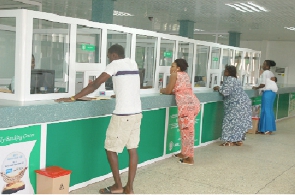Rural and Community Banks (RCBs) could face exacerbated liquidity challenges in the times ahead if the impacts from coronavirus on the economy persist for long as they await payment of locked up investments with collapsed fund management firms.
The future looks quite bleak for the rural banking space as the two main sources of income – loan portfolio and investment income – are not looking too good at the moment.
RCBs which have their funds with defunct companies are yet to receive their monies as promised by government.
The Securities and Exchange Commission (SEC) in November 2019 revoked the licences of 53 fund management companies, and most RCBs have their investments with those affected companies.
The B&FT has learnt that there is significant decline in loan applications and repayment among RCBs due to the devastating effect of COVID-19 on businesses and the economy at large. Salary advances, which have been low-hanging fruit in loan portfolios, have also been frozen.
Workers, especially those in the private sector bracket, are not even sure of the time to receive salaries, and the quantum to be paid as well – thus making it difficult for banks to offer overdrafts or salary advances while the workers themselves are also sceptical of mortgaging.
With constricted income streams as against massive withdrawals, most banks are likely to see their liquidity buffers come under significant pressures. Certainly, banks will be compelled to recalibrate their books as the situation will throw the 2020 outlook and projections out of gear. Eventually, it is likely to erode the profitability of most RCBs.
Dickson Owusu Ansah, General Manager of Kaaseman Rural Bank at Sefwi-Kaase in the Bia East district of the Western-North Region, told the B&FT that in the face of prevailing challenges, the bank is likely to review its 2020 budget after second-quarter of the year to make it more realistic.
“The board and management will have to make certain critical decisions after June. The future is not very clear; most of our clients are unable to lodge funds as expected, while loan applicants have also reduced. Per the situation, it is not likely that the bank can achieve a GH¢34million loan portfolio for 2020. We will now target more cocoa and cashew farmers as compared to commerce operators. Should COVID-19 travel with us till end of the year, it’ll be extremely difficult for the bank,” he said.
Stephen Yaw Adu-Yeboah, General Manager-Capital Rural Bank at Abesim near Sunyani, on his part said: “People are not taking loans; even if they come for them they don’t know where to invest them.
Basically, the few that are applying for loans are into the food and beverages sector, poultry farming and retailoring of sanitary items. If the situation continues for long, the bank will not be able to meet its loan portfolio target of going from GH¢7.4million in 2019 to GH¢9.7million in 2020.
“After two months, if the situation does not normalise, the bank is likely to restructure operations including deferment of loan repayments. We’ll be looking on a case by case basis and proffer suitable measures. For instance, under our church development loan scheme, we will be offering between three to six-months moratorium. On the other hand, businesses that are doing well will be given additional monies to cushion the growth of those businesses.”
He prayed government to make judicious disbursement of the GH¢600million stimulus package to quicken resurrection of the economy, indicating that the bulk of the support must be targetted at viable sectors like agribusiness. “As we speak, our lifeline is to live and survive so that we can fight the pandemic to bring back other sectors of the economy.”
Michael Wilberforce Osae, General Manager of Amantin and Kasei Community Bank at Amantin in the Bono East Region, revealed that the bank is not exempted from the trickle-down effect of COVID-19 on the rural banking sector; largely high loan repayment default, continuous withdrawals and decline in deposits.
The bank projects total deposits of GH¢35million by close of the year as against a loan portfolio of GH¢22million. It also budgeted for a profit of about GH¢700,000.
The General Manager said: “By June ending, we will revise the initial 2020 projections based on the trend. The bank will reschedule loan repayments with moratoriums, and if possible waive a percentage of interest on overdrafts.”
Click to view details



Business News of Tuesday, 26 May 2020
Source: thebftonline.com

















